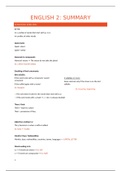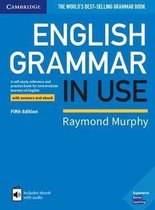ENGLISH 2: SUMMARY
SPARKLING SPELLING:
In/ Im:
Im = prefixe of words that start with p, m, b.
In= prefixe of other words
Quiet/quite
Quiet= silent
Quite= rather
Numerals in compounds:
Numeral- nouns => The nouns do not take the plural
Ex: a three-month holiday
Doubling of final consonants:
One syllable:
If the word ends with a consonant/ vowel/ 2 syllables or more:
consonant Same rule but only if the stress is on the last
If the suffix begins with a vowel syllable
Ex: Stopped
Ex: focusing, beginning
⚠This rule doesn’t take for the words that ends with x,w
⚠If the word ends with a vowel + L => de L is always doubled
There/ their:
There = express a place
Their = possessive of they
Adjectives ending in y:
The y becomes a i when a suffix is added
Ex: lucky => luckily
Months/ Days/ Nationalities:
Months, days, nationalities, countries, towns, languages => CAPITAL LETTER
Words ending in LL:
LL => if words are alone => Ex: full
L => if words are compounds => Ex: fulfil
1
,Loose/ Lose:
Loose = los
Lose/ lost/ lost = verloren, kwijtraken
Choose/ Chose/ Chosen:
Choose = infinitif
Chose = simple past
Chosen = past participle
Then/ Than :
Then = used in comparaisons
Than = used in indications
Joins:
Never add or subtract a letter at a join
Ex: Legal + ly = legally
To/ too:
To = te
Too = ook
Nouns ending in our:
If we add the suffix ous => the u of the our is dropped.
Ex: Humour => Humorous
Adjectives ending in ic:
They take ally when they become adverbs.
Ex: Basic => Basically
One’s/ Ones:
One’s = genitive of one
Ones = plural of one
Ex: give me ones of these ones.
It’s/ Its:
Its = something
It’s = it+ is
Of/ off:
Of= van
Off = used to express a distance
2
,ADVERBS AND ADJECTIVES
Adjectives are used with: Adverbs are used with:
- A noun - An adjective
- A pronoun - Another adverb
- Some verbs (Ex: be, look, feel…) - A past participle
Many adverbs are adjectives + ly (Ex: quickly)
But not all words ending with ly are adverbs (Ex: lovely = Adjective)
⚠Past/ Hard/ Late/ High/ Direct = are both adverbs and adjectives
⚠Lately = recently
⚠Hardly = very little, almost not, certainly not
⚠Difficultly doesn’t exist => With difficulty
ADVERBIALS:
POSITION OF ADVERBIALS:
Manner – Direction – Place – Duration – Frequenty – Time
Front position = to express the contrast
Sometimes, he went to the pub.
Mid position= Before the main verb/ Between the auxiliary and the verb
Rule: Adverb of manner in one word AND that ends with Ly => go to the mid position
⚠Also, always, still… are always in the mid position BUT after the verb to be.
I always study
I am always late
End position = neutral position
3
, RELATIVE PRONOUNS:
WHO:
- Used to refers to people
The woman who is always late
WHOM:
- Used to refers to a direct object
- Used after a preposition
The teacher whom I met a year ago quickly became a friend
WHOSE:
- Used to express a possession of a people
This guy whose name is difficult to spell is Croatian
WHICH:
- Used to refers to objects
- Used to express the possession of objects
The camera which I’m using is great
- Used if the antecedent is a clause
He told me he was disappointed, which was quite obvious.
THAT:
- Can be used like who/ which but less good English
The old man that you saw at the wedding is my grandfather.
The old man whom you saw at the wedding is my grandfather.
THAT preferred to WHICH:
- after superlatives (Ex: good – better – best)
- after ordinal numbers (Ex: first, second, third, …)
- all, much, little, none, few, only
- every, some, any, nothing
WHERE:
- Used if the antecedent is a place
The city where I lived
4





